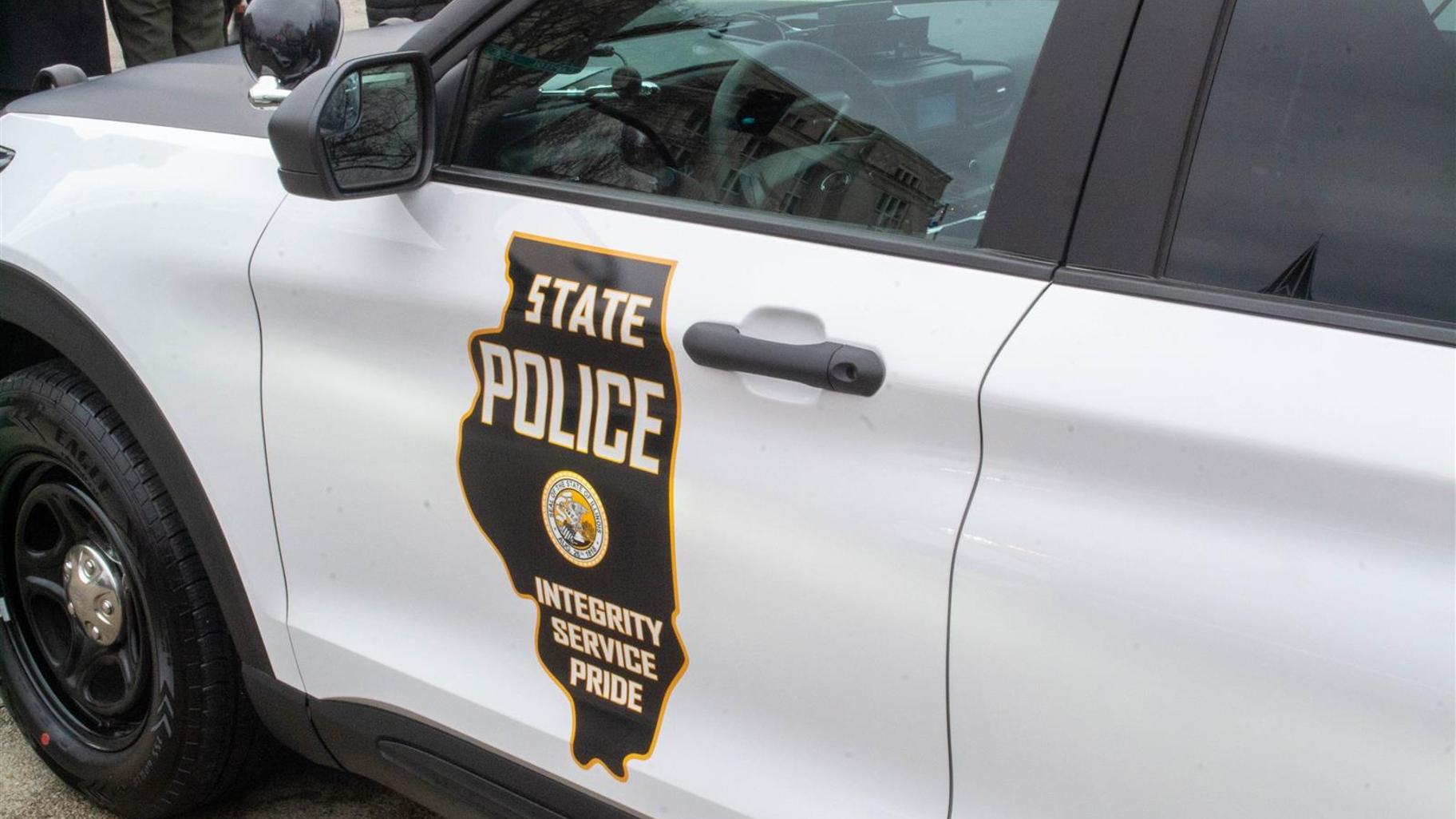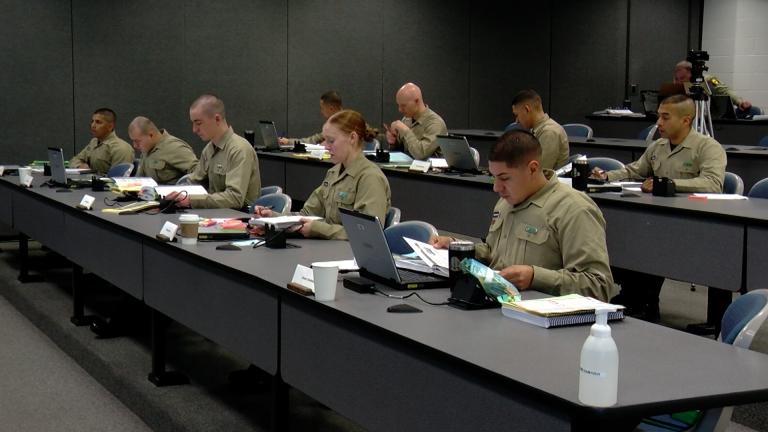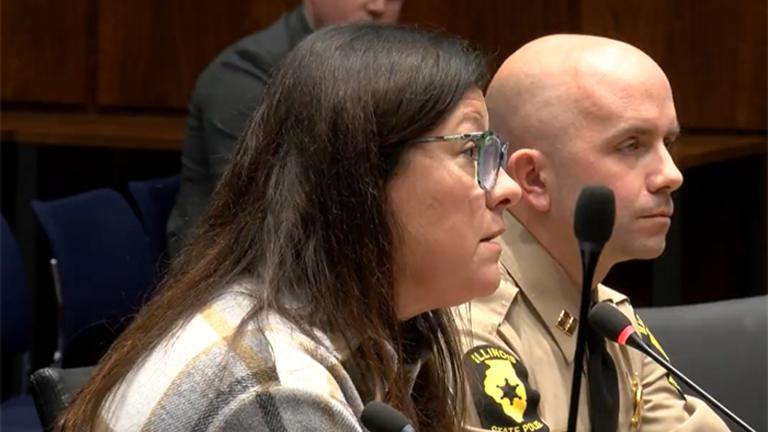 An Illinois State Police squad car is pictured in a file photo. (Jerry Nowicki / Capitol News Illinois)
An Illinois State Police squad car is pictured in a file photo. (Jerry Nowicki / Capitol News Illinois)
Gunfire, a reckless driver, a noisy neighbor at 3 a.m. — all are reasons someone may think to call the police.
Illinois is encouraging people to report another type of suspicious and potential criminal activity: corruption.
The Illinois State Police website now has a form to “file a citizen complaint of an elected official, appointee or employee of a public body,” and credible cases will be pursued by ISP’s Special Investigative Unit, a group of agents dedicated to investigating public corruption cases.
“By making it easier for the public to confidentially report suspected corruption, we can begin restoring the public’s trust in government,” state police director Brendan Kelly said in a news release. “ISP will continue to work with its partners in law enforcement to investigate misconduct and corruption.”
The release goes on to give examples of report-worthy activity, which “may include an elected official steering contracts to friends in exchange for a monetary kickback, overbilling a contractor and embezzling the money, personally benefiting from federal/state-funded programs, wire fraud, and money laundering.”
The move raises the eyebrows of ethics watchdog Kent Redfield, a longtime University of Illinois Springfield political scientist.
Redfield said the “public corruption” mandate is “incredibly broad,” particularly given the ISP’s more obvious long-standing directives, be it having troopers on highways or seizing guns from those who shouldn’t legally have them.
“The mandate they’re claiming is incredibly broad in terms of intimidation by public officials, fraud, procurement but also elections and misuse of official positions which means who knows what,” Redfield said. “That’s just straight word salad. I don’t know what they are focusing on. And there’s potential for a lot.”
Those areas can require specific expertise, he said, in subjects like banking, procurement rules and election law.
“If you’re overloading your plate, you’re not being as effective,” Redfield said.
In other ways, he said, the objective is too narrow.
The online form says the “investigative priorities are public corruption crimes, and criminal misconduct by elected officials and government appointees” and defines public corruption as “a breach of the public’s trust by government officials who use their office to obtain personal gain.”
“So now all of a sudden they’ve really narrowed what they’re looking for,” Redfield said.
Redfield said corruption can take many forms beyond person gain. He said potentially that could mean intimidation of public officials, like intimidating a judge or harassing election workers and poll watchers.
It’s also unclear from the website and intake form whether the ISP is ready to take on old-school Chicago corruption, in which a political boss arranges a job or ghost payroll setup for an ally.
“A patronage situation usually doesn’t involve personal gain,” Redfield said. “You’re aggregating power by doing favors for people. They’re getting the benefit of the job or whatever it happens to be, but I’m not getting richer, I’m benefiting in terms of power.”
Redfield also worries it will lead to duplicative investigations, which could potentially interfere with one another and could jeopardize a probe.
Illinois has inspectors general over state agencies and the legislature, and each county has a state’s attorney with prosecutorial power that the ISP lacks.
The ISP’s resources pale in comparison to that of the federal government, Redfield said.
“There’s a potential here for creating overlap, duplication, ineffective use of resources,” Redfield said.
The goal, state police said, is the opposite and to eliminate parallel investigations.
Per the news release, “having allegations reported to one place will streamline the process and allow ISP to respond more quickly. ISP will triage all online submissions and determine the correct agency to handle the investigation.”
State police spokeswoman Melaney Arnold said that “as with any crime, ISP will continue to determine the appropriate law enforcement agency to handle each complaint.”
“Law enforcement agencies coordinate and collaborate on investigations,” Arnold said in an email. “This online form and process is designed to eliminate duplication.”
Arnold said there was no mandate for the ISP to proactively take on corruption.
“While ISP has investigated public corruption since its inception, the creation of the Special Investigation Unit was to bring additional investigative resources and streamline the investigative process to make it more efficient and effective,” Arnold wrote.
Members of the public who fill out the form must attest that their complaint is against either an appointed or elected government official and that allegations are “true.”
Arnold said the form requires an individual provide a phone number and email address so that special agents can get in touch as they pursue an investigation, but a name and address are not required.
Individuals can call and talk with an agent and would not need to provide identifying information, Arnold said.
The new avenue for reporting corruption could serve as fresh outlet for would-be whistleblowers who don’t come forward for fear of retribution.
Imagine a situation in which a political rivalry could come into play when reporting to a mayoral-appointed police chief, or a whistleblower with a corruption concern about a county board member going to a county’s state’s attorney, when state’s attorneys’ budgets are determined in large part by county boards.
Arnold said since its creation in March 2020 ISP’s Special Investigative Unit has opened more than 80 cases. At least two resulted in local officials pleading guilty to felonies — a township road commissioner who used the government credit card to spend $27,300 on personal purchases and a county coroner who misspent tens of thousands of taxpayer dollars on personal travel.
Follow Amanda Vinicky on Twitter: @AmandaVinicky







